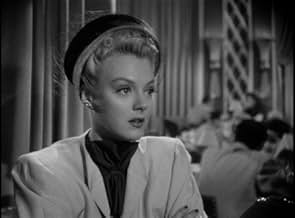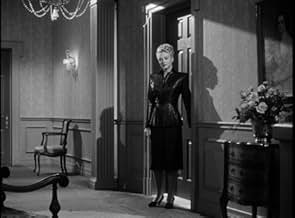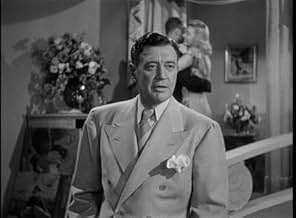Un artista sposato con una donna ricca e malata ha una relazione con una sua modella. La moglie la scopre e minaccia di escluderlo dal testamento. Per poter tenere sia i soldi che la ragazza... Leggi tuttoUn artista sposato con una donna ricca e malata ha una relazione con una sua modella. La moglie la scopre e minaccia di escluderlo dal testamento. Per poter tenere sia i soldi che la ragazza, inizia ad avvelenare sua moglie.Un artista sposato con una donna ricca e malata ha una relazione con una sua modella. La moglie la scopre e minaccia di escluderlo dal testamento. Per poter tenere sia i soldi che la ragazza, inizia ad avvelenare sua moglie.
- Regia
- Sceneggiatura
- Star
- George
- (non citato nei titoli originali)
- Messenger Boy
- (non citato nei titoli originali)
- Artist
- (non citato nei titoli originali)
- Henry Loring
- (non citato nei titoli originali)
- Whistler
- (non citato nei titoli originali)
- Jorgensen
- (non citato nei titoli originali)
- McLaren aka Mac
- (non citato nei titoli originali)
- Butler
- (non citato nei titoli originali)
- Girl
- (non citato nei titoli originali)
- Detective Lieutenant
- (non citato nei titoli originali)
- Girl
- (non citato nei titoli originali)
Recensioni in evidenza
Nonetheless, the story keeps us watching. As usual we can't be sure how events will turn out since Dix's character is as morally compromised as in the other entries. Unlike other Hollywood films of that era, there is no one to root for as the plot unfolds. Thus, it's the story itself that holds our interest, and not the more predictable question of how a hero will triumph. Fortunately, the ending comes up with the usual fine touch of irony that fans expect.
There's an expertly shaded performance by Mary Currier as Dix's star-crossed wife. Watch the subtlety of her expressions as she learns about her wayward husband. The series itself did not depend on subtle acting-- and certainly Dix doesn't manage the Lothario role very well. Nonetheless, Currier delivers an A-grade performance. (In passing-- I expected the screenplay to develop the scheming relationship between blonde model Kay and her effete boyfriend Jim more fully than it did. That could have set up an interesting dynamic of those schemers competing against another schemer, Dix.) Anyway, stylish or not, this remains a very watchable hour of frustrated passion and the hand of fate.
*** (out of 4) T
he sixth film in Columbia's series and the last to feature Richard Dix. In the film Dix plays an artist who begins dating a younger woman (Leslie Brooks) while waiting for his wife to die. After the wife dies he marries the younger woman but soon she starts to fear that he might have killed the first wife. This is another good entry in the series that manages to build some nice suspense with its very entertaining story and another fine performance by Dix. Not only is Dix very good in his role but the supporting cast is great as well. Brooks turns in a very good performance as the woman who begins to suspect the worst. Michael Duane and Mary Currier co-star as a newspaper man and Dix's first wife. The story goes by at a very fast pace and there's some nice twists and turns along the way. The film focuses on a psychological horror aspect, which is where the suspense comes from.
Again the Whistler just walks around as Narrator. He doesn't get involved in the plot.
The series stars Richard Dix. Here he plays Ralph Harrison, a not great artist who lives off his sick wife's (Mary Currier) money. In the beginning of the film, we see her ordering her own gravestone!
Edith Harrison has a terminal heart condition. When her husband meets model Kay Morrell (the very pretty Leslie Brooks), he falls in love with her. However, a new doctor has gotten Edith out of her sickbed and ready to live again.
Edith goes to her husband's studio to surprise him. She's the one surprised as she overhears him declaring his love for Kay and saying Edith will be gone soon. In fact, he decides to help her along.
Richard Dix is an actor I have a hard time with. I find his acting not good, along with his hairpiece, and he's quite rigid. Sometimes he's a good guy in the Whistler series; here he's a bad one. There's a twist at the end.
This is the best Whistler I've seen.
Otherwise, as is usual in the Whistler fliks, the supporting actors are adequate, and the dialogue slightly corny and dated, but with a time of barely over an hour, the pace is quick and satisfying.
A very interesting directorial decision: three years before this movie was made (that is, 1943) the great western, The Ox-bow Incident, was released. In the famous last scene, Henry Fonda reads aloud the last letter written by the lynched Dana Andrews. Fonda's eyes, and eyes alone, are not visible, hidden behind the brim of Henry Morgan's hat, while we see his mouth move. A very effective idea.
Well, here, in The Secret of the Whistler, the director uses the exact same idea: in a late scene, Richard Dix's wife makes a startling confession, her eyes hidden by an intruding lamp shade, but her mouth visible as she speaks, with Dix looking on behind her. Again, interesting.
Lastly, look for Dix's wife walking around with about a half-dozen dead minks or stoles or whatever they are, complete with heads, draped across her left shoulder. I don't why this struck me as funny, but, in its gratuitous pointlessness, it did.
Definitely a fun way to spend 65 minutes.
In this outing he plays a man married to a woman purely for her money and who falls in love with a younger woman who is after him purely for his (her) money. How the situation is nefariously resolved is the plot, simply and carefully plotted. The way the actors spoke their words beginning with capital letters in this - and other entries in the series - makes me think this must have been adapted and expanded from one of the scripts of the 231 radio plays already aired by then. Whether playing a goodie, baddie or bothie Dix exuded a simple yet intense sincerity, he's basically a baddie with all the usual human failings in here and yet you can still find yourself rooting for the poor mutt. Leslie Brooks as the not-too-bad gold-digger artists model was never more alluring, I was definitely rooting for her! There's a poignant twist at the end, so attention is recommended.
Sadly neglected, about time they were all available on DVD, a nice entry in a nice series for those of us who like the genre.
Lo sapevi?
- QuizThis is the penultimate film of Richard Dix, being 99th out of the 100 he made.
- BlooperAfter Harrison's servant discovers Mrs Harrison lying on the floor, using the bedroom phone tells Loring she hangs up and then calls the doctor. But, the phone downstairs that she originally answered when Loring called is still off the hook and therefore she would not be able to make the call.
- Citazioni
Ralph Harrison: What's the matter, Darling?
Edith Marie Harrison: Stop acting, Ralph. There's nothing quite so contemptible as a hypocrite.
- ConnessioniFollowed by The Thirteenth Hour (1947)
- Colonne sonorePut The Blame On Mame
Written by Allan Roberts and Doris Fisher
Played during the party in Ralph's studio
I più visti
Dettagli
- Data di uscita
- Paese di origine
- Siti ufficiali
- Lingua
- Celebre anche come
- Секрет Свистуна
- Azienda produttrice
- Vedi altri crediti dell’azienda su IMDbPro
- Tempo di esecuzione
- 1h 5min(65 min)
- Colore
- Proporzioni
- 1.37 : 1
































